中国组织工程研究 ›› 2026, Vol. 30 ›› Issue (11): 2858-2869.doi: 10.12307/2026.123
• 组织构建循证医学 evidence-based medicine in tissue construction • 上一篇 下一篇
长期运动对肥胖或超重群体食欲激素干预效果的Meta分析
辛显阳,刘龙雁,郭咏晴,汪 海,谢 军
- 首都体育学院,北京市 100191
-
收稿日期:2025-04-09接受日期:2025-07-02出版日期:2026-04-18发布日期:2025-09-06 -
通讯作者:谢军,博士,教授,博士生导师,首都体育学院,北京市 100191 -
作者简介:辛显阳,男,1999年生,山东省泰安市人,汉族,首都体育学院在读博士,主要从事身体运动功能训练与运动促进健康研究。 -
基金资助:中国科协研究生科普能力提升项目(KXYJS2024007),项目负责人:谢军
Effects of long-term exercise interventions on appetite-regulating hormones in overweight and obese populations: a meta-analysis
Xin Xianyang, Liu Longyan, Guo Yongqing, Wang Hai, Xie Jun
- Capital University of Physical Education and Sports, Beijing 100191, China
-
Received:2025-04-09Accepted:2025-07-02Online:2026-04-18Published:2025-09-06 -
Contact:Xie Jun, PhD, Professor, Doctoral supervisor, Capital University of Physical Education and Sports, Beijing 100191, China -
About author:Xin Xianyang, PhD candidate, Capital University of Physical Education and Sports, Beijing 100191, China -
Supported by:Graduate Student Science Popularization Capacity Enhancement Project of China Association for Science and Technology, No. KXYJS2024007 (to XJ)
摘要:
文题释义:
食欲激素:是调节食欲和能量平衡的激素,影响身体对食物的摄取和消耗。它们通过与大脑和其他器官的相互作用,帮助维持体质量和能量稳态。
胃饥饿素:是由胃壁细胞分泌的激素,主要在饥饿时分泌。胃饥饿素的两种形式为酰化胃饥饿素和非酰化胃饥饿素,在食欲调节中有不同作用,酰化胃饥饿素有助于刺激食欲和进食,而非酰化胃饥饿素则不具有此作用。
摘要
目的:长期运动被推荐作为减肥手段,但对肥胖或超重人群食欲激素的具体影响仍不清晰。为此,通过Meta分析评估长期运动对肥胖或超重群体食欲激素的干预效果。
方法:系统检索PubMed、EBSCO、Cochrane Library、Web of Science和Embase从建库至2024年12月的随机对照试验。研究对象为超重或肥胖人群,结局指标为食欲激素(胃饥饿素、酰化胃饥饿素、酪酪肽、胰高血糖素样肽1)。使用Review Manager 5.4和Stata 16软件对纳入文献进行Meta分析。
结果:长期运动干预显著提升胃饥饿素(SMD=0.46,P=0.007)和胰高血糖素肽1(SMD=0.43,P=0.04)水平,对酰化胃饥饿素(SMD=-0.18,P=0.39)和酪酪肽(SMD=0.23,P=0.39)的调节作用不显著。结果异质性较高,提示个体差异和干预方案对效果有潜在影响。高强度间歇训练调节食欲激素的效果显著,抗阻运动次之,但具体机制尚不明确。短周期的运动训练对于酪酪肽和胰高血糖素样肽1的影响更加显著,但效果随周期延长逐渐减弱。
结论:长期运动通过调节食欲激素对肥胖或超重人群的食欲产生抑制作用,高强度间歇训练和抗阻运动在这一领域表现出独特的干预效果,值得进一步深入研究。
中国组织工程研究杂志出版内容重点:干细胞;骨髓干细胞;造血干细胞;脂肪干细胞;肿瘤干细胞;胚胎干细胞;脐带脐血干细胞;干细胞诱导;干细胞分化;组织工程
中图分类号:
引用本文
辛显阳, 刘龙雁, 郭咏晴, 汪 海, 谢 军. 长期运动对肥胖或超重群体食欲激素干预效果的Meta分析[J]. 中国组织工程研究, 2026, 30(11): 2858-2869.
Xin Xianyang, Liu Longyan, Guo Yongqing, Wang Hai, Xie Jun. Effects of long-term exercise interventions on appetite-regulating hormones in overweight and obese populations: a meta-analysis[J]. Chinese Journal of Tissue Engineering Research, 2026, 30(11): 2858-2869.
2.2 纳入文献的基本特征 纳入29篇文献,肥胖或超重患者共包含1 758例[17-19,28-53]。其中包含48项研究,即1篇文献中若包含多种研究方法,则每种研究方法算作1项研究。其中,胃饥饿素相关的研究数量最多,共计26项;酰化胃饥饿素、酪酪肽和胰高血糖素样肽1相关研究均为18项。训练干预类型主要有有氧运动、抗阻运动、联合运动、高强度间歇训练,纳入文献基本特征见表1。
2.3 纳入文献的偏倚风险评价结果 纳入研究的偏倚风险评价结果见图3,4。共有27篇文献明确陈述了分组分配的方法,没有文献报告了分配隐藏,2篇文献报告了数据分析盲法。在数据的完整性评价条目中,失访率超过20%且未采用意向性分析则评价为高风险,纳入研究中共1篇失访率
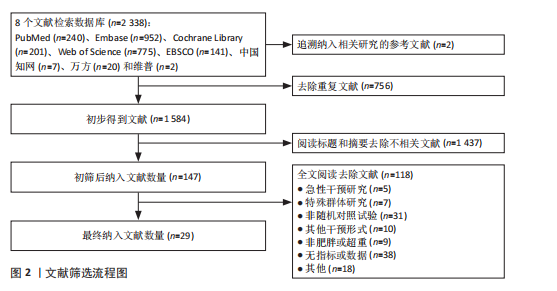
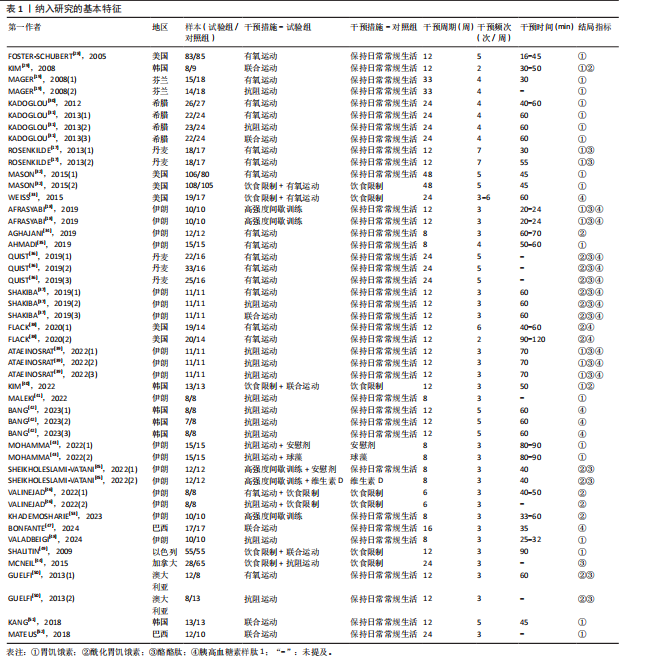
超过20%,28篇文献报告了失访率,试验组和对照组失访数目和原因相似。在其他偏倚中,纳入研究受试者样本量低于10人(小样本量偏倚)、运动干预缺乏监督、存在利益冲突等其中一项因素则评价为高风险,20篇文献不具有其他偏倚。根据每个条目风险评价情况对每一项研究进行综合评级,评级方法参考已有研究[27],高质量文献19篇,中质量文献9篇,低质量文献1篇。
2.4 Meta分析结果
2.4.1 胃饥饿素 运动干预对胃饥饿素激素水平的影响共纳入26项研究,包括1 329名参与者。异质性检验结果(I2=86%,P < 0.000 01)显示存在较高的异质性,因此选择随机效应模型进行效应量的合并分析。合并效应量为 SMD=0.46(95%CI:0.13-0.79,P=0.007),提示效应量具有统计学意义。运动干预对胃饥饿素激素水平具有中等改善作用,提示运动干预在调节胃饥饿素水平方面具有重要意义(图5)。
2.4.2 酰化胃饥饿素 运动干预对酰化胃饥饿素激素水平的影响共纳入18项研究,包括460名参与者。异质性检验结果(I2=77%,P < 0.000 01)显示存在较高的异质性,因此选择随机效应模型进行效应量的合并分析。合并效应量为 SMD=-0.18(95%CI:
-0.59-0.23,P=0.39),提示效应量无统计学意义。结果显示,运动干预对酰化胃饥饿素激素水平的总体影响较小且不显著(图6)。
2.4.3 酪酪肽 运动干预对酪酪肽激素水平的影响共纳入18项研究,包括543名参与者。异质性检验结果(I2=86%,P < 0.000 01)显示存在较高的异质性,因此选择随机效应模型进行效应量的合并分析。合并效应量为 SMD=0.23(95%CI:-0.29-0.74,P=0.39),提示效应量无统计学意义。结果显示,运动干预对酪酪肽激素水平的总体影响较小且不显著(图7)。
2.4.4 胰高血糖素肽1 运动干预对胰高血糖素样肽1激素水平的影响共纳入18项研究,包括476名参与者。异质性检验结果(I2=78%,P < 0.000 01)显示存在较高的异质性,因此选择随机效应模型进行效应量的合并分析。合并效应量为 SMD=0.43(95%CI:0.01-0.85,P=0.04),提示效应量具有统计学意义。结果显示,长期运动可能通过提升胰高血糖素样肽1水平,增强饱腹感并促进能量摄入控制,在肥胖管理中具有重要应用潜力(图8)。
2.5 亚组分析结果 各个指标仍然存在着较高的异质性,为进一步探究潜在异质性来源,对潜在的调节变量进行亚组分析,确定各亚组合并效应量。亚组分析结果表明不同运动方案组成要素对肥胖或超重人群食欲激素指标影响效果不同(表2)。
抗阻运动(SMD=1.84)和联合运动(SMD=0.88)对胃饥饿素水平有显著促进作用,而高强度间歇训练有显著抑制作用,有氧运动的效果较弱。较少的干预次数(≤3次/周或4次/周)和中等干预周期(8周<周期≤12周)对胃饥饿素调节最有效。长期干预(12周<周期≤48周)效果不显著,且频次增加到一定程度后效果趋于平缓甚至下降。
抗阻运动是唯一显著降低酰化胃饥饿素水平的运动类型(SMD=-1.05),但异质性较高,提示不同研究间可能
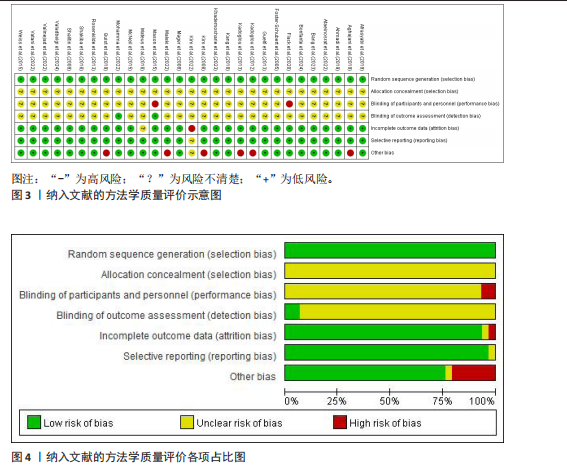
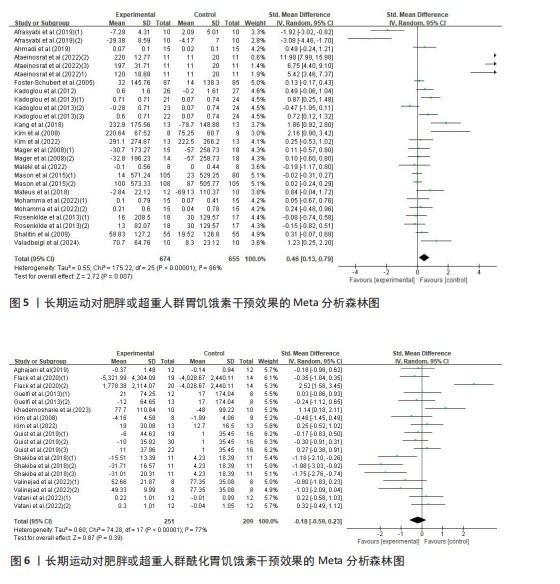
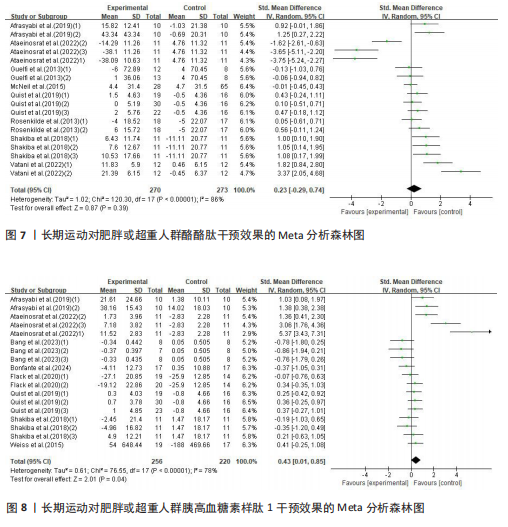
存在设计差异。有氧运动和联合运动对酰化胃饥饿素的效果不显著且异质性较高。高强性间歇运动虽然对酰化胃饥饿素的提升效果不显著,但是酰化胃饥饿素表现出了与其他运动不同的发展趋势。干预次数和干预周期对酰化胃饥饿素的影响结果不显著,研究结果差异不明显。
高强度间歇训练对酪酪肽水平的提升最为显著(SMD=1.76),其次是联合运动和有氧运动。抗阻运动对酪酪肽的作用表现为下降趋势,但未达显著性,且异质性较高。中等频次(4次/周<次数≤7次/周)效果显著且结果一致(异质性为0)。低干预周期(≤ 8周)显著提升酪酪肽水平(SMD=2.53),但异质性较高,中期干预(8周<周期≤12周)提升酪酪肽水平不显著,长期干预(12周<周期≤48周)酪酪肽水平有下降趋势但不显著且异质性较高。
高强度间歇训练显著提升胰高血糖素样肽1水平(SMD=1.19),是最有效的运动类型,且异质性较低;有氧运动效果接近显著,抗阻运动和联合运动效果均不显著。较少的干预次数(≤3次/周)显著提升胰高血糖素样肽1水平,但异质性较高;中等频次干预无显著效果;中期干预(8周<周期≤12周)对胰高血糖素样肽1水平的提升效果接近显著,但异质性较高,长期干预12周<周期≤48周)无显著效果,提示长期干预可能效果有限。
2.6 敏感性分析 为保证Meta分析结果的可靠性,通过敏感性分析探讨是否某一项研究对整体产生较大的影响。通过在整体研究基础上进行逐一剔除的方式来评估每个研究对整体效应量的影响。结果显示各项指标剔除某一研究后对整体效应量及异质性影响不大,表明Meta分析的结果稳定可靠(图9)。
2.7 发表偏倚结果分析 发表偏倚是对系统评价中结果是否存在偏倚的一种检验,该研究联合使用漏斗图、Begg’s检验和Egger’s检验评估纳入研究整体的发表偏倚规模。对食欲激素的4个指标进行定性和定量分析[54]。如图10所示,酰化胃饥饿素、酪酪肽和胰高血糖素样肽1的漏斗图显示两侧基本左右对称分布在漏斗图顶部,形成倒置漏斗形,只有胃饥饿素图形左右侧不十分对称,可能存在部分发表偏倚。Begg’s检验和Egger’s检验结果显示,酰化胃饥饿素、酪酪肽和胰高血糖素样肽1的P均> 0.05。而胃饥饿素Begg’s检验=0.010 6和Egger’s检验=0.020,P均< 0.05,因此进行了剪补法,剪补添加4个研究,合并效应量发生变化,但是仍存在显著差异(SMD= 0.87,95%CI:0.48-1.26,P < 0.05),综合判断结果较为稳健。
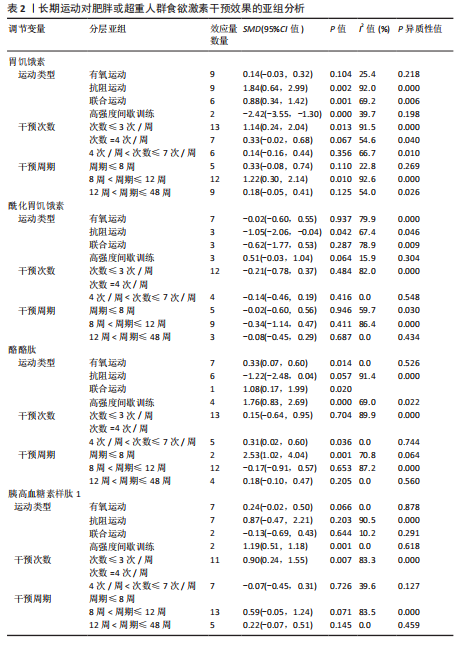

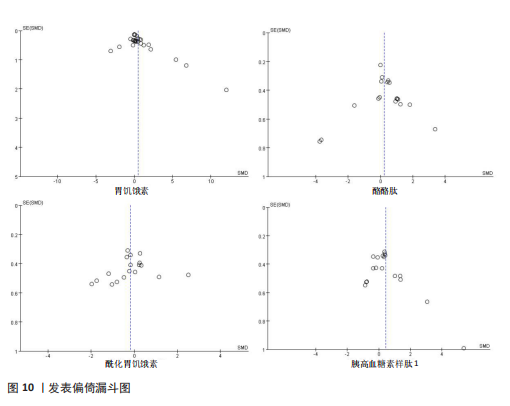
| [1] BRAY GA. Medical consequences of obesity. J Clin Endocrinol Metab. 2004;89(6):2583-2589. [2] 中国营养学会肥胖防控分会,中国营养学会临床营养分会,中华预防医学会行为健康分会,等.中国居民肥胖防治专家共识[J].西安交通大学学报(医学版),2022, 43(4):619-631. [3] CUCIUREANU M, CARATAȘU CC, GABRIELIAN L, et al. 360-Degree Perspectives on Obesity. Medicina (Kaunas). 2023;59(6):1119. [4] DRAGANO NRV, FERNØ J, DIÉGUEZ C, et al. Recent Updates on Obesity Treatments: Available Drugs and Future Directions. Neuroscience. 2020;437:215-239. [5] 中国营养学会肥胖防控分会,西安交通大学全球健康研究院,国际肥胖与代谢性疾病研究中心,等.2025年世界肥胖报告[J].西安交通大学学报(医学版),2025, 46(2):363-379. [6] STENSEL DJ. How can physical activity facilitate a sustainable future? Reducing obesity and chronic disease. Proc Nutr Soc. 2023;82(3):286-297. [7] MILLER WC, KOCEJA DM, HAMILTON EJ. A meta-analysis of the past 25 years of weight loss research using diet, exercise or diet plus exercise intervention. Int J Obes Relat Metab Disord. 1997;21(10): 941-947. [8] HOPKINS M, KING NA, BLUNDELL JE. Acute and long-term effects of exercise on appetite control: is there any benefit for weight control? Curr Opin Clin Nutr Metab Care. 2010;13(6):635-640. [9] MARTINS C, MORGAN L, TRUBY H. A review of the effects of exercise on appetite regulation: an obesity perspective. Int J Obes (Lond). 2008;32(9):1337-1347. [10] KING NA, CAUDWELL PP, HOPKINS M, et al. Dual-process action of exercise on appetite control: increase in orexigenic drive but improvement in meal-induced satiety. Am J Clin Nutr. 2009;90(4):921-927. [11] STROHACKER K, MCCAFFERY JM, MACLEAN PS, et al. Adaptations of leptin, ghrelin or insulin during weight loss as predictors of weight regain: a review of current literature. Int J Obes (Lond). 2014;38(3):388-396. [12] ALMESBEHI T, HARRIS L, MCGARTY A, et al. Effects of exercise training programmes on fasting gastrointestinal appetite hormones in adults with overweight and obesity: A systematic review and meta-analysis. Appetite. 2023;182:106424. [13] FINLAYSON G, BRYANT E, BLUNDELL JE, et al. Acute compensatory eating following exercise is associated with implicit hedonic wanting for food. Physiol Behav. 2009;97(1):62-67. [14] BECIC T, STUDENIK C, HOFFMANN G. Exercise Increases Adiponectin and Reduces Leptin Levels in Prediabetic and Diabetic Individuals: Systematic Review and Meta-Analysis of Randomized Controlled Trials. Med Sci (Basel). 2018;6(4):97. [15] DORLING J, BROOM DR, BURNS SF, et al. Acute and Chronic Effects of Exercise on Appetite, Energy Intake, and Appetite-Related Hormones: The Modulating Effect of Adiposity, Sex, and Habitual Physical Activity. Nutrients. 2018;10(9):1140. [16] GOLBIDI S, LAHER I. Exercise induced adipokine changes and the metabolic syndrome. J Diabetes Res. 2014;2014: 726861. [17] ROSENKILDE M, REICHKENDLER MH, AUERBACH P, et al. Appetite regulation in overweight, sedentary men after different amounts of endurance exercise: a randomized controlled trial. J Appl Physiol (1985). 2013;115(11):1599-1609. [18] AFRASYABI S, MARANDI SM, KARGARFARD M. The effects of high intensity interval training on appetite management in individuals with type 2 diabetes: influenced by participants weight. J Diabetes Metab Disord. 2019;18(1):107-117. [19] MAGER U, KOLEHMAINEN M, DE MELLO VD, et al. Expression of ghrelin gene in peripheral blood mononuclear cells and plasma ghrelin concentrations in patients with metabolic syndrome. Eur J Endocrinol. 2008;158(4):499-510. [20] MITOIU BI, NARTEA R, MICLAUS RS. Impact of Resistance and Endurance Training on Ghrelin and Plasma Leptin Levels in Overweight and Obese Subjects. Int J Mol Sci. 2024;25(15):8067. [21] XIN X, WANG H, GUO Y, et al. Effect of long-term exercise on circulating ghrelin in overweight and obese individuals: a systematic review and meta-analysis. Front Nutr. 2025;12:1518143. [22] 中国肥胖问题工作组.中国学龄儿童青少年超重、肥胖筛查体重指数值分类标准[J].中华流行病学杂志,2004,25(2):97-102. [23] Physical status: the use and interpretation of anthropometry. Report of a WHO Expert Committee. World Health Organ Tech Rep Ser. 1995;854:1-452. [24] JACKSON M, FATAHI F, ALABDULJADER K, et al. Exercise training and weight loss, not always a happy marriage: single blind exercise trials in females with diverse BMI. Appl Physiol Nutr Metab. 2018;43(4):363-370. [25] MANTHOU E, GILL JM, WRIGHT A, et al. Behavioral compensatory adjustments to exercise training in overweight women. Med Sci Sports Exerc. 2010;42(6):1121-1128. [26] HIGGINS JP, ALTMAN DG, GØTZSCHE PC, et al. The Cochrane Collaboration’s tool for assessing risk of bias in randomised trials. BMJ. 2011;343:d5928. [27] CIPRIANI A, FURUKAWA TA, SALANTI G, et al. Comparative efficacy and acceptability of 21 antidepressant drugs for the acute treatment of adults with major depressive disorder: a systematic review and network meta-analysis. Lancet. 2018;391(10128):1357-1366. [28] FOSTER-SCHUBERT KE, MCTIERNAN A, FRAYO RS, et al. Human plasma ghrelin levels increase during a one-year exercise program. J Clin Endocrinol Metab. 2005; 90(2):820-825. [29] KIM HJ, LEE S, KIM TW, et al. Effects of exercise-induced weight loss on acylated and unacylated ghrelin in overweight children. Clin Endocrinol (Oxf). 2008;68(3):416-422. [30] KADOGLOU NP, VRABAS IS, KAPELOUZOU A, et al. The impact of aerobic exercise training on novel adipokines, apelin and ghrelin, in patients with type 2 diabetes. Med Sci Monit. 2012;18(5):CR290-295. [31] KADOGLOU NP, FOTIADIS G, KAPELOUZOU A, et al. The differential anti-inflammatory effects of exercise modalities and their association with early carotid atherosclerosis progression in patients with type 2 diabetes. Diabet Med. 2013; 30(2):e41-50. [32] MASON C, XIAO L, IMAYAMA I, et al. The effects of separate and combined dietary weight loss and exercise on fasting ghrelin concentrations in overweight and obese women: a randomized controlled trial. Clin Endocrinol (Oxf). 2015;82(3):369-376. [33] WEISS EP, ALBERT SG, REEDS DN, et al. Calorie Restriction and Matched Weight Loss From Exercise: Independent and Additive Effects on Glucoregulation and the Incretin System in Overweight Women and Men. Diabetes Care. 2015;38(7):1253-1262. [34] AGHAJANI R, ZIDASHTI ZH, NEMATI N, et al. Nervous Evaluation Conducted by the Changes of Ghrelin and Obestatin Executed by Aerobic Exercise. Brain-Broad Res Arti. 2019;10(4):101-114. [35] AHMADI SM, FATHI M, RASHIDLAMIR A, et al. Effects of 8 Weeks Aerobic Training on Plasma Ghrelin Level and Ghrelin Lymphocyte Gene Expression in Elderly Men. Iran J Aging. 2019;13(4):494-505. [36] QUIST JS, BLOND MB, GRAM AS, et al. Effects of active commuting and leisure-time exercise on appetite in individuals with overweight and obesity. J Appl Physiol (1985). 2019;126(4):941-951. [37] SHAKIBA E, SHEIKHOLESLAMI-VATANI D, ROSTAMZADEH N, et al. The type of training program affects appetite-regulating hormones and body weight in overweight sedentary men. Appl Physiol Nutr Metab. 2019;44(3):282-287. [38] FLACK KD, HAYS HM, MORELAND J, et al. Exercise for Weight Loss: Further Evaluating Energy Compensation with Exercise. Med Sci Sports Exerc. 2020; 52(11):2466-2475. [39] ATAEINOSRAT A, HAGHIGHI MM, ABEDNATANZI H, et al. Effects of Three Different Modes of Resistance Training on Appetite Hormones in Males With Obesity. Front Physiol. 2022;13:827335. [40] KIM HJ, TAK YJ, LEE SY, et al. Effects of a 12-Week Diet versus Diet plus Aerobic and Resistance Exercise Program on Acylated and Desacylated Ghrelin, and Ghrelin O-Acyltransferase in Adolescent Girls with Obesity. Int J Environ Res Public Health. 2022;19(3):1480. [41] MALEKI F, SAFARZADE A. The Effects of Resistance Training on some Inflammatory Markers, Appetite-Regulating Peptides and Insulin Resistance Index in Obese Women. Indian J Endocrinol Metab. 2022;26(6):524-529. [42] BANG HS. Effect of Resistance Training with Different Set Structures on Neurotrophic Factors and Obesity-Related Biomarkers in Middle-Aged Korean Women with Obesity. J Clin Med. 2023;12(9):3135. [43] MOHAMMAD M, KARIM D, MEHDI M, et al. The Combinatory Effect of Spirulina Supplementation and Resistance Exercise on Plasma Contents of Adipolin, Apelin, Ghrelin, and Glucose in Overweight and Obese Men. Mediators Inflamm. 2022; 2022:9539286. [44] MCNEIL J, SCHWARTZ A, RABASA-LHORET R, et al. Changes in leptin and peptide YY do not explain the greater-than-predicted decreases in resting energy expenditure after weight loss. J Clin Endocrinol Metab. 2015;100(3):E443-452. [45] SHEIKHOLESLAMI-VATANI D, ROSTAMZADEH N. Changes in Appetite-Dependent Hormones and Body Composition After 8 Weeks of High-Intensity Interval Training and Vitamin D Supplementation in Sedentary Overweight Men. Front Nutr. 2022;9:827630. [46] VALINEJAD A, KHODAEI K. Does exercise during a ketogenic diet effectively alter appetite sensation, appetite-regulating hormones, and body composition? Exp Biol Med (Maywood). 2022;247(21):1898-1906. [47] BONFANTE ILP, DUFT RG, MATEUS KCDS, et al. Combined training and hormones/enzymes with insulinotropic actions in individuals with overweight and type 2 diabetes mellitus: A randomized controlled trial. Eur J Sport Sci. 2024;24(1):97-106. [48] VALADBEIGI A, AZIZBEIGI K. Elastic resistance training has positive influence on the functional capacity and appetite hormone in overweight men. Sport Sci Health. 2024;20(2):475-481. [49] SHALITIN S, ASHKENAZI-HOFFNUNG L, YACKOBOVITCH-GAVAN M, et al. Effects of a twelve-week randomized intervention of exercise and/or diet on weight loss and weight maintenance, and other metabolic parameters in obese preadolescent children. Horm Res. 2009;72(5):287-301. [50] GUELFI KJ, DONGES CE, DUFFIELD R. Beneficial effects of 12 weeks of aerobic compared with resistance exercise training on perceived appetite in previously sedentary overweight and obese men. Metabolism. 2013;62(2):235-243. [51] KANG SJ, KIM JH, GANG Z, et al. Effects of 12-week circuit exercise program on obesity index, appetite regulating hormones, and insulin resistance in middle-aged obese females. J Phys Ther Sci. 2018;30(1):169-173. [52] MATEUS KC, BRUNELLI DT, GÁSPARI AF, et al. Effects of combined training on total ghrelin and tumor necrosis factor-α in obese middle-aged men. Motriz: Revista de Educação Física. 2018;24:e1018143. [53] KHADEMOSHARIE M, MOLLANOVRUZI A. Effects of High-Intensity Training Upon Appetite, Body Mass, Aerobic Capacity, and Metabolic Hormones in Overweight Women. Endocrinology Research and Practice. 2023;27(1):21-27. [54] EGGER M, DAVEY SMITH G, SCHNEIDER M, et al. Bias in meta-analysis detected by a simple, graphical test. BMJ. 1997; 315(7109):629-634. [55] TSCHÖP M, WEYER C, TATARANNI PA, et al. Circulating ghrelin levels are decreased in human obesity. Diabetes. 2001;50(4):707-709. [56] CHEN C, ZHANG D, YE M, et al. Effects of various exercise types on inflammatory response in individuals with overweight and obesity: a systematic review and network meta-analysis of randomized controlled trials. Int J Obes (Lond). 2025;49(2):214-225. [57] CEDERBERG H, RAJALA U, KOIVISTO VM, et al. Unacylated ghrelin is associated with changes in body composition and body fat distribution during long-term exercise intervention. Eur J Endocrinol. 2011;165(2):243-248. [58] RODRÍGUEZ A, GÓMEZ-AMBROSI J, CATALÁN V, et al. Association of plasma acylated ghrelin with blood pressure and left ventricular mass in patients with metabolic syndrome. J Hypertens. 2010;28(3):560-567. [59] LORIA-KOHEN V, FERNÁNDEZ-FERNÁNDEZ C, BERMEJO LM, et al. Effect of different exercise modalities plus a hypocaloric diet on inflammation markers in overweight patients: a randomised trial. Clin Nutr. 2013; 32(4):511-518. [60] YU AP, UGWU FN, TAM BT, et al. One Year of Yoga Training Alters Ghrelin Axis in Centrally Obese Adults With Metabolic Syndrome. Front Physiol. 2018;9:1321. [61] HEISTON EM, EICHNER NZM, GILBERTSON NM, et al. Two weeks of exercise training intensity on appetite regulation in obese adults with prediabetes. J Appl Physiol (1985). 2019;126(3):746-754. [62] GUEUGNON C, MOUGIN F, NGUYEN NU, et al. Ghrelin and PYY levels in adolescents with severe obesity: effects of weight loss induced by long-term exercise training and modified food habits. Eur J Appl Physiol. 2012;112(5):1797-1805. [63] CAMPOS RM, DE MELLO MT, TOCK L, et al. Aerobic plus resistance training improves bone metabolism and inflammation in adolescents who are obese. J Strength Cond Res. 2014;28(3):758-766. [64] WU W, ZHU L, DOU Z, et al. Ghrelin in Focus: Dissecting Its Critical Roles in Gastrointestinal Pathologies and Therapies. Curr Issues Mol Biol. 2024;46(1):948-964. [65] MILLS JG, LARKIN TA, DENG C, et al. Weight gain in Major Depressive Disorder: Linking appetite and disordered eating to leptin and ghrelin. Psychiatry Res. 2019;279:244-251. [66] PAPANDREOU D, KARAVOLIAS C, ARVANITI F, et al. Fasting Ghrelin Levels Are Decreased in Obese Subjects and Are Significantly Related With Insulin Resistance and Body Mass Index. Open Access Maced J Med Sci. 2017;5(6):699-702. [67] MARTINS C, STENSVOLD D, FINLAYSON G, et al. Effect of moderate- and high-intensity acute exercise on appetite in obese individuals. Med Sci Sports Exerc. 2015;47(1):40-48. [68] HOLLIDAY A, BLANNIN AK. Very Low Volume Sprint Interval Exercise Suppresses Subjective Appetite, Lowers Acylated Ghrelin, and Elevates GLP-1 in Overweight Individuals: A Pilot Study. Nutrients. 2017; 9(4):362. [69] MORISHIMA T, KURIHARA T, HAMAOKA T, et al. Whole body, regional fat accumulation, and appetite-related hormonal response after hypoxic training. Clin Physiol Funct Imaging. 2014;34(2):90-97. [70] ZOUHAL H, LEMOINE-MOREL S, MATHIEU ME, et al. Catecholamines and obesity: effects of exercise and training. Sports Med. 2013;43(7):591-600. [71] KRAEMER WJ, RATAMESS NA. Hormonal responses and adaptations to resistance exercise and training. Sports Med. 2005; 35(4):339-361. [72] BILSKI J, TELEGŁÓW A, WARZECHA Z, et al. Effects of Exercise on Appetite and Food Intake Regulation. Medicina Sportiva. 2009;13:82-94. [73] BATTERHAM RL, LE ROUX CW, COHEN MA, et al. Pancreatic polypeptide reduces appetite and food intake in humans. J Clin Endocrinol Metab. 2003;88(8):3989-3992. [74] BATTERHAM RL, COWLEY MA, SMALL CJ, et al. Gut hormone PYY(3-36) physiologically inhibits food intake. Nature. 2002;418(6898):650-654. [75] HANSEN HH, HANSEN G, PAULSEN S, et al. The DPP-IV inhibitor linagliptin and GLP-1 induce synergistic effects on body weight loss and appetite suppression in the diet-induced obese rat. Eur J Pharmacol. 2014;741:254-263. [76] SHAH M, VELLA A. Effects of GLP-1 on appetite and weight. Rev Endocr Metab Disord. 2014;15(3):181-187. [77] MOHAMMADI A, BIJEH N, MOAZZAMI M, et al. Effect of Exercise Training on Spexin Level, Appetite, Lipid Accumulation Product, Visceral Adiposity Index, and Body Composition in Adults With Type 2 Diabetes. Biol Res Nurs. 2022;24(2):152-162. [78] HOSSEIN N, MEHDI M, KARIM D, et al. Spirulina supplementation and circuit resistance training (CRT) reduce serum asprosin and appetite and improve energy balance in men with obesity and overweight. Hormones (Athens). 2025; 24(1):23-31. [79] ADAM TC, WESTERTERP-PLANTENGA MS. Activity-induced GLP-1 release in lean and obese subjects. Physiol Behav. 2004;83(3):459-466. [80] BRECHET S, PLAISANCIÉ P, DUMOULIN V, et al. Involvement of beta1- and beta2- but not beta3-adrenoceptor activation in adrenergic PYY secretion from the isolated colon. J Endocrinol. 2001;168(1):177-183. [81] ELLINGSGAARD H, HAUSELMANN I, SCHULER B, et al. Interleukin-6 enhances insulin secretion by increasing glucagon-like peptide-1 secretion from L cells and alpha cells. Nat Med. 2011;17(11):1481-1489. [82] SHIRAZI R, PALSDOTTIR V, COLLANDER J, et al. Glucagon-like peptide 1 receptor induced suppression of food intake, and body weight is mediated by central IL-1 and IL-6. Proc Natl Acad Sci U S A. 2013;110(40):16199-16204. [83] NILSSON A, JOHANSSON E, EKSTRÖM L, et al. Effects of a brown beans evening meal on metabolic risk markers and appetite regulating hormones at a subsequent standardized breakfast: a randomized cross-over study. PLoS One. 2013;8(4):e59985. [84] LARSON-MEYER DE, WILLIS KS, WILLIS LM, et al. Effect of honey versus sucrose on appetite, appetite-regulating hormones, and postmeal thermogenesis. J Am Coll Nutr. 2010;29(5):482-493. [85] LIN J, JIANG Y, WANG G, et al. Associations of short sleep duration with appetite-regulating hormones and adipokines: A systematic review and meta-analysis. Obes Rev. 2020;21(11):e13051. [86] MANDIC I, AHMED M, RHIND S, et al. The effects of exercise and ambient temperature on dietary intake, appetite sensation, and appetite regulating hormone concentrations. Nutr Metab (Lond). 2019; 16:29. [87] 邓潇潇,杨贤罡,李春燕,等.低氧运动和生活方式回归对超重肥胖青年能量摄入和食欲激素的影响[J].北京体育大学学报,2023,46(11):92-101. [88] 吴娜娜,管延飞,朱欢,等.高住低练对肥胖青少年血浆食欲调节激素的影响[J].中国应用生理学杂志,2015,31(3):281-283. [89] HAZELL TJ, ISLAM H, TOWNSEND LK, et al. Effects of exercise intensity on plasma concentrations of appetite-regulating hormones: Potential mechanisms. Appetite. 2016;98:80-88. [90] BEAULIEU K, HOPKINS M, BLUNDELL J, et al. Impact of physical activity level and dietary fat content on passive overconsumption of energy in non-obese adults. Int J Behav Nutr Phys Act. 2017;14(1):14. [91] GOLTZ FR, THACKRAY AE, KING JA, et al. Interindividual Responses of Appetite to Acute Exercise: A Replicated Crossover Study. Med Sci Sports Exerc. 2018;50(4): 758-768. |
| [1] | 刘 煜, 雷森林, 周锦涛, 刘 辉, 李先辉. 有氧和抗阻运动改善肥胖相关认知障碍的作用机制[J]. 中国组织工程研究, 2026, 30(5): 1171-1183. |
| [2] | 陶云飞, 彭 莉. 血流限制在急性抗阻运动中对内皮功能相关炎性因子的影响[J]. 中国组织工程研究, 2026, 30(5): 1184-1195. |
| [3] | 李秀鹏, 苏玉莹, 王悦同, 彭 亮, 王艺达, 荆 雯. 低容量高强度间歇训练对肥胖或超重人群心血管疾病风险因子影响的Meta分析[J]. 中国组织工程研究, 2025, 29(12): 2590-2604. |
| [4] | 朱小烽, 陈为玮, 黄 健. 母鼠高脂饮食与运动干预对雄性子代胰岛素敏感性及下丘脑弓状核的影响[J]. 中国组织工程研究, 2024, 28(4): 556-561. |
| [5] | 代新语, 闫纪红, 华凌军, 郑晓鸿. 抗阻运动改善超重肥胖人群身体成分:一项伞形综述[J]. 中国组织工程研究, 2024, 28(2): 267-271. |
| [6] | 韩维娜, 徐晓庆, 史晋宁, 李欣儒, 蔡红艳. 胰高血糖素样肽1受体激动剂治疗阿尔茨海默病的潜在靶点预测及验证[J]. 中国组织工程研究, 2024, 28(16): 2568-2573. |
| [7] | 刘仁凡, 吕丽婷, 伍 怡, 王 璐. 不同强度训练方式对2型糖尿病超重或肥胖者体成分及糖代谢影响的Meta分析[J]. 中国组织工程研究, 2024, 28(14): 2274-2281. |
| [8] | 王永生, 吴 旸, 李燕春. 急性大强度运动对成年人食欲激素影响的Meta分析[J]. 中国组织工程研究, 2021, 25(8): 1305-1312. |
| [9] | 江小燕, 朱海飞, 蔺海旗, 林文弢. 冷疗干预延迟性肌肉酸痛的自限性恢复[J]. 中国组织工程研究, 2021, 25(23): 3609-3613. |
| [10] | 卢 杰, 李 雪, 王 璐, 范 佳, 张业廷, 卢晓斌, 袁琼嘉. 不同强度游泳训练对大鼠空间学习记忆和小脑食欲素的影响[J]. 中国组织工程研究, 2021, 25(23): 3697-3703. |
| [11] | 杨璐瑶, 付鹏宇, 唐舒宁, 朱镕鑫, 龚丽景. Ghrelin-GHSR 通路在 4 周间歇低氧改善小鼠肥胖机体的变化[J]. 中国组织工程研究, 2021, 25(11): 1733-1739. |
| [12] | 鹿 琦. 超重成年人步态特征与能耗[J]. 中国组织工程研究, 2020, 24(36): 5779-5784. |
| [13] | 余 宏,刘 琰,李 波. 高强度循环训练超重人群身体成分、心肺功能及代谢指标的变化[J]. 中国组织工程研究, 2019, 23(11): 1738-1742. |
| [14] | 李 沛,张 静,金 萱. 体质量指数对不同年龄不孕女性体外受精结局的影响[J]. 中国组织工程研究, 2016, 20(15): 2212-2217. |
| [15] | 吴娜娜,王 茹,王雪强,管延飞. 急性运动成年人血浆胃肠激素肽水平变化的Meta分析[J]. 中国组织工程研究, 2015, 19(15): 2455-2460. |
一些研究认为,肥胖或超重群体经长时间的运动训练会改变食欲激素水平,从而增加进食的动力[10-11],这是因为运动引起的能量消耗都可能会潜在地诱发食欲、饥饿感[12],促进食物的消耗和能量摄入,导致肥胖和超重群体的减肥效果低于预期,甚至导致减肥后体质量反弹[13-16];尽管有研究发现运动可能增加饥饿感,但也有证据表明肥胖或超重群体长期运动不仅通过增加能量消耗来帮助减肥,还可能通过调控食欲激素分泌,提升空腹或餐后的饱腹感[17-18],从而降低能量摄入,提高减肥效果;另外,还有一部分研究认为长期运动对肥胖或超重群体食欲激素不会产生影响[12,17,19]。
长期运动对肥胖或超重群体食欲激素的影响尚未得出统一的结论。
食欲激素在食欲控制中发挥着核心作用,研究最广泛的是胃饥饿素、酰化胃饥饿素、酪酪肽和胰高血糖素样肽1[6]。目前,仅有1篇Meta分析整合这些激素的研究结果,研究结论表明运动对肥胖或超重群体的食欲激素水平未产生显著影响,但因纳入文献数量有限,仍存在不确定性[12],并且最新的1篇综述和Meta分析的结论与这篇Meta分析的结论恰恰相反[20-21]。该研究旨在探索长期运动对肥胖或超重人群食欲的影响,以及从食欲影响能量摄入角度为选择减肥的运动方式提供科学依据。
中国组织工程研究杂志出版内容重点:干细胞;骨髓干细胞;造血干细胞;脂肪干细胞;肿瘤干细胞;胚胎干细胞;脐带脐血干细胞;干细胞诱导;干细胞分化;组织工程
该方案已在国际系统综述前瞻性注册中心注册(CRD42024628013)。
1.1 资料来源 文献纳入与排除标准 按照参与者、干预、比较、结果和研究设计(PICOS)原则制订标准。
纳入标准:①研究对象为不同年龄阶段的超重或肥胖人群,成年欧洲人界定标准为体质量指数≥25 kg/m2(超重)或体质量指数≥30 kg/m2(肥胖),成年亚洲人界定标准为体质量指数≥24 kg/m2(超重)或体质量指数≥28 kg/m2(肥胖);儿童少年超重和肥胖判定标准依据世界卫生组织(WHO)或受试者所在国家的公认标准[22-23]。②纳入的运动干预类型包括有氧运动、抗阻运动、有氧与抗阻相结合的联合运动以及高强度间歇训练,纳入至少持续4周的运动干预措施,基于已有证据表明,这一时间长度足以引起可测量的体质量和体脂变化[24-25]。③纳入对照组不采取任何运动干预或仅为轻微的拉伸活动,如果试验设计以是否进行运动干预为区分标准,且其他干预条件(如饮食限制)保持一致,则该研究仍符合纳入标准。例如:对照组采用饮食限制,干预组采用相同的饮食限制加运动干预。④结局指标为运动干预前后的食欲激素水平,包括胃饥饿素、酰化胃饥饿素、酪酪肽和胰高血糖素样肽1。⑤研究类型:随机对照试验。
排除标准:①非中英文文献;②学位论文、会议记录或摘要,无法获取全文;③无法从文献中提取出有效的结局数据,且联系作者无果;④重复发表的文献;⑤特殊群体(孕妇、术后、暴食症、厌食症等)。
1.2 文献检索策略 计算机检索中国知网、万方、维普、PubMed、EBSCO、Cochrane Library、Web of Science和Embase数据库,搜集有关运动对超重或肥胖人群食欲影响的随机对照试验,检索时限均为各数据库建库时间至2024年12月。采用主题词结合自由词的检索策略,此外,追溯纳入文献的参考文献,以补充获取相关文献,以PubMed和中国知网数据库检索策略为例,见图1。
1.3 文献筛选 由2名研究者独立筛选文献、提取资料并交叉核对,如遇分歧,则咨询第三方协助判断,缺乏的资料尽量与作者联系予以补充。文献筛选时首先阅读题目和摘要,在排除明显不相关的文献后,进一步阅读全文,以确定最终是否纳入。
1.4 纳入研究的偏倚风险评价 纳入研究的偏倚风险评价由2名研究者独立按照Cochrane手册进行评估[26],如果2名研究者评估结果出现差异,则咨询第三方协助判断,以确保评价结果的客观性和可靠性。随机对照试验评分标准包括:随机序列生成、分配隐藏、盲法(受试者和研究人员)、盲法评估结果、不完全结局数据、选择性报告及其他偏倚。最后将纳入的文献从低到高分为3个等级,评级方法参考已有研究[27]:如果上述各条目无高风险,且风险不明确数量≤3,则将研究归类为高质量;如果存在1个高风险,或无高风险但风险不明确数量≥4,则归类为中质量;所有其他情况均评价为低质量。
1.5 资料提取 文献数据提取分别由2名研究者采取独立双盲的方式进行,资料提取内容主要包括:第一作者、发表年份、干预对象(各组样本量、性别、年龄、体质量指数、体质量)、干预措施(运动方式、周期、频率、运动时间)和结局指标(试验组和对照组前测与后测值)。结局指标在全文中无法获取时先通过联系主要通讯作者进行索取,如无法索取则对文章进行排除。
1.6 统计学分析 采用Review Manager 5.4和Stata 16软件进行效应量合并、亚组分析、敏感性分析和发表偏倚检验。为减小基线差异的影响,该研究采用干预前后平均值和标准差的变化值进行效应量合并。纳入相关研究指标为连续性变量且测量单位不统一,因此,结局指标效应量采用SMD及95%置信区间(95%CI)来表示。P≤0.05时,合并效应存在统计学意义,反之,则不具有统计学意义。采用I2来检验统计学异质性,低度异质性为I2 < 50%,中度异质性为50%≤I2 < 75%,高度异质性为I2≥75%。根据异质性大小采取固定效应模型或随机效应模型对纳入文献进行分析。I2≥50%时需进行敏感性分析,检验所获结果是否稳定,并根据文献的特点进行亚组分析来探讨异质性的来源。
利用森林图来表示合并效应量的统计学意义,小效应量为SMD < 0.5,中等效应量为0.5≤SMD < 0.8,大效应量为SMD≥0.8。采用 Begg’s 检验、Egger’s 检验及漏斗图对纳入文献的发表偏倚进行定量和定性分析。该文章统计方法已经通过首都体育学院谢军教授审核。
食欲激素的调节对能量摄入的变化至关重要,不仅直接影响减肥效果,还可能通过改善代谢功能和减少慢性疾病风险带来多方面的健康益处。该研究基于循证医学方法,系统评估了长期运动对肥胖或超重人群食欲激素的调节作用。研究结果为制定针对性运动干预方案提供了理论基础,并对优化肥胖管理策略具有重要参考价值。
3.1 长期运动对肥胖或超重人群胃饥饿素与酰化胃饥饿素的影响 胃饥饿素水平由酰化胃饥饿素和非酰化胃饥饿素组成。其中,酰化胃饥饿素作为胃饥饿素的活性形式,直接参与刺激食欲和能量代谢,而非酰化胃饥饿素对食欲无影响[18]。研究表明,肥胖和代谢综合征患者的胃饥饿素水平、酰化胃饥饿素/非酰基胃饥饿素(AG/DAG)比值较高[55-57],但酰化胃饥饿素水平无明显变化,提示肥胖可能与非酰化胃饥饿素的相对缺乏有关[58]。
此研究结果表明,运动干预能够显著改善肥胖或超重人群的胃饥饿素水平,具有中等程度的正向效果,这一结果与最近的1篇综述和Meta分析相同[20-21]。多数学者认为运动训练后胃饥饿素的增加可能作为减肥的代偿机制,而不是过度摄食[59-60],这表明胃饥饿素在体质量下降的适应性反应中发挥重要作用[61-64]。
多项研究发现,运动诱导的体质量减轻与胃饥饿素水平升高呈正相关[37,65-68],当体质量下降超过3 kg时,胃饥饿素水平变化尤为显著[32,69]。
但是目前减轻体质量、增加循环胃饥饿素水平的确切过程尚不清楚[20]。还有学者认为胃饥饿素分泌可能通过儿茶酚胺相关机制受到运动强度的影响[20,70];抗阻运动和联合运动对胃饥饿素水平具有显著促进作用,而高强度间歇训练则表现出显著抑制作用,不同运动方式对于胃饥饿素的特殊作用值得进一步研究。
该研究显示,尽管运动干预显著提升总胃饥饿素水平,但对酰化胃饥饿素的影响不显著,甚至呈下降趋势。
抗阻运动显著降低酰化胃饥饿素水平,为探索特定运动方式对酰化胃饥饿素的调节作用提供了重要线索。抗阻运动能够显著降低酰化胃饥饿素的机制可能是长期运动训练(尤其是抗阻运动)导致空腹血清生长激素水平升高[71],通过负反馈机制导致空腹酰化胃饥饿素水平降低[72]。然而,抗阻运动的异质性较高,可能与研究设计或个体差异有关,需进一步分析其潜在影响因素。此外,高强度间歇训练能够提高酰化胃饥饿素水平,尽管调节效果不显著,但是此研究纳入的研究数量较少还需要进一步验证;MITOIU等[20]认为肥胖相关基因FTO(rs9939609a等位基因)可能与肥胖、热量消耗增加和酰化胃饥饿素水平升高有关,并且与这种等位基因相关的肥胖风险可以通过运动来降低。当丁基胆碱酯酶水解酰化胃饥饿素时产生非酰化胃饥饿素抑制食物摄入并延迟胃排空,从而导致负能量平衡状态和体质量下降[40];运动和FTOrs9939609基因型可能对丁基胆碱酯酶活性、酰化胃饥饿素、非酰化胃饥饿素和卡路里摄入有未知的影响。运动可以纠正AA型肥胖人群中增加的酰化胃饥饿素水平,提高丁基胆碱酯酶活性,降低酰化胃饥饿素和酰化胃饥饿素/非酰基胃饥饿素比值[20]。
Meta分析显示,长期运动干预对胃饥饿素的总体调节作用显著,但酰化胃饥饿素水平呈下降趋势,这表明运动引起的胃饥饿素水平增加主要由非酰化胃饥饿素贡献。该研究Meta分析与KIM等[40]的研究结果相同,运动引起的总胃饥饿素水平增加可能归因于非酰化胃饥饿素,而不是酰化胃饥饿素。为期12周的有氧和阻力运动后,运动组非酰化胃饥饿素水平大于对照组,这为运动在改善非酰化胃饥饿素方面的有利作用提供了证据[40],所以可能不会有提高食欲的现象,而且表达为食欲下降。未来研究应重点关注酰化胃饥饿素与非酰化胃饥饿素的变化,探索不同运动方式和周期对两者的调节作用,而不仅局限于胃饥饿素水平的研究。
3.2 长期运动对肥胖或超重人群酪酪肽和胰高血糖素多样肽的影响 酪酪肽与胰高血糖素样肽1是两种关键的厌食激素,在减少能量摄入和调节食欲方面具有重要作用。饱腹感是由胰腺分泌的激素酪酪肽引起的[18]。在饥饿时,酪酪肽血浆浓度降低,而进食后,酪酪肽浓度升高,然后刺激饱腹感,从而停止进食[73-74]。胰高血糖素样肽1已被证实在食欲调节中具有重要作用,作用机制包括延迟胃排空、减少食物摄入以及抑制胰高血糖素分泌[18,75-76]。
该研究结果显示,运动干预对酪酪肽水平的整体改善作用不显著。值得注意的是,干预周期对酪酪肽似乎具有很大的影响,研究发现短期干预对于酪酪肽的影响作用较大,随着干预周期的延长,对酪酪肽的影响逐渐减弱,甚至无效。QUIST等[36]发现有规律的剧烈运动导致短暂的(即在第3个月而不是第6个月)抑制食欲和降低随意能量摄入。通过食欲感知量表发现多数研究短期干预的效果更加显著,而长期运动干预效果会减弱[45-46,50,77-78],这一趋势表明酪酪肽对运动干预可能具有时间依赖性;高强度间歇训练对酪酪肽的提升效果最为显著,其次是联合运动和有氧运动,抗阻运动则显示出下降趋势,这可能与个别研究设计的差异有关。
该研究结果显示,运动干预能够一定程度上提高胰高血糖素样肽1水平,这提示运动可能通过增强饱腹感,进一步优化能量代谢调节。高强度间歇训练是提升胰高血糖素样肽1水平最有效的运动类型,有氧运动接近显著,可能对胰高血糖素样肽1水平具有一定的调节作用。中期干预(8-12周)对胰高血糖素样肽1水平的提升效果接近显著,但异质性较高;而长期干预(> 12周)效果有限,提示胰高血糖素样肽1对运动干预可能存在时间依赖性,遗憾的是缺失8周以下运动周期的研究,作者猜测8周以下的研究能引起胰高血糖素样肽1更大的反应效果,需进一步验证。
运动对酪酪肽和胰高血糖素样肽1的具体影响机制尚不明确,但已有研究提出以下可能机制:运动通过增加交感神经系统活性和儿茶酚胺水平,促进肠道细胞分泌酪酪肽和胰高血糖素样肽1[79-80];还有一些研究认为炎症因子(白细胞介素6、肿瘤坏死因子α)的变化可能与酪酪肽和胰高血糖素样肽1之间存在相关性,已经在一些动物、人体试验中得到了证实[18,81-82]。最近的1篇针对肥胖或超重群体的网状Meta分析发现,高强度间歇训练是改善白细胞介素6、肿瘤坏死因子α和白细胞介素10最有效的运动方式[56],同样可以解释高强度间歇训练对酪酪肽和胰高血糖素样肽1的高效作用可能是由炎症因子变化引起的;研究发现短周期运动对食欲影响很大,随着运动周期的延长效果逐渐减弱[45-46,50,77-78],作者认为可能和酪酪肽和胰高血糖素样肽1有关,未来研究应注重高质量试验设计,探索不同运动类型、干预周期与酪酪肽和胰高血糖素样肽1调节之间的作用机制,并结合炎症因子的变化深入分析内在联系。
该研究的异质性较大,可能源于食欲及食欲激素本身易受多种因素的影响。此次纳入的研究涉及多个国家与地区,不同人群在饮食偏好、饮食结构及饮食习惯方面存在差异,这可能导致研究对象有能量摄入及食欲激素变化的差异,从而引起研究之间的结果差异[83-84]。此外,食欲激素的分泌和变化还受到睡眠时间[85]、环境温度[86]、低压低氧条件等因素的综合影响[87-88],上述因素的存在进一步加剧了研究结果的异质性。不过,此研究所纳入的文献均为随机对照试验,各研究中的试验组与对照组,除运动干预外,其他条件保持一致,因此研究结论依然具有较高的可信性。其次,异质性较大的另一个重要原因在于不同试验方案设计上的差异。敏感性分析显示,纳入指标的总体效应量较为稳定,去除任一单项研究后效应值变化幅度均不明显,说明Meta分析的整体结果较为稳健。然而,在去除某些研究后,效应量或置信区间变化相对明显,尤其集中在抗阻运动与高强度间歇训练相关研究中,其中最显著的是ATAEINOSRA等[39]和SHEIKHOLESLAMI-VATANI等[45]两项研究,分析原因可能是不同运动干预措施的生理效应存在显著差异所致。ATAEINOSRA等[39]研究干预持续时间较长,每次运动总时长达70 min,运动总体代谢当量消耗较高,引起了更明显的体质量指数和体质量变化,从而导致食欲激素变化更为显著,这可能是引起较大异质性的主要原因之一。SHEIKHOLESLAMI-VATANI等[45]研究则在后4周采用了以100%最大摄氧量强度进行运动干预的方案,该运动强度显著高于其他纳入研究。已有研究表明,运动强度对食欲激素的影响存在显著差异[89]。此外,SHEIKHOLESLAMI-VATANI等[45]研究的第2组试验设计中,试验组与对照组虽均服用了相同剂量的维生素D,但高强度间歇训练与维生素D联合使用可能产生额外的协同效应,这可能进一步增加了该研究结果的异质性。最后,还发现不同研究在采血时间及血样处理方法等方面存在差异(比如运动结束与采血的间隔时间),这些细节同样可能导致研究结果的差异。因此,建议未来研究建立标准化的试验流程和血样处理方法,以提高研究之间结果的可比性,并有效降低研究的整体异质性。
综上所述,该研究发现高强度间歇训练和抗阻运动在调节食欲激素方面表现出独特的效果,优于其他运动干预形式。然而,纳入研究数量有限,机制仍需进一步验证;研究显示,胃饥饿素与酰化胃饥饿素水平对运动周期和次数的变化不敏感,表明其调节作用可能更多依赖于其他生理机制或个体差异。运动干预对酪酪肽和胰高血糖素样肽1的调节呈现出时间依赖性。短期干预(< 8周)效果显著,而长期干预(> 12周)效果逐渐减弱甚至反转,可能与激素的适应性变化有关。
3.3 研究局限性 研究异质性较高,在解释一些结论时需要谨慎对待,这种异质性可能来源于研究方法的差异,例如采血期间的食物摄入量、采样时间点等因素[90]。食欲相关激素对运动反应存在较大的个体差异这也是导致异质性较大的原因[91];该研究选择了最常见的4种食欲激素(胃饥饿素、酰化胃饥饿素、胰高血糖素样肽1、酪酪肽),以提高研究的可靠性。但需要注意,除了这些激素外,其他内分泌学因素在运动与食欲的相互作用中也可能发挥重要作用,未被此研究纳入。
3.4 适用性及对未来研究的启示 该研究结果表明,长期运动干预对肥胖或超重人群的食欲激素水平具有显著影响,亚组分析结果进一步揭示了食欲激素变化在不同时间阶段的显著特征,未来研究应进一步开展高质量的研究,以验证食欲激素变化的阶段性特征,并深入探讨潜在的生理机制。针对不同运动类型对肥胖或超重人群食欲激素水平的特异性影响,未来研究可采用网状Meta分析或高质量的随机对照试验等方法,以系统评估不同运动模式对目标指标的影响,并进一步比较相对有效性。
3.5 研究结论 ①长期运动会显著提升肥胖群体的胃饥饿素与胰高血糖素样肽1水平,对于酰化胃饥饿素与酪酪肽的影响不显著,酰化胃饥饿素有降低的趋势,而酪酪肽有增加的趋势;②从这4种激素的变化来看运动导致肥胖群体的食欲激素趋向于食欲降低,并且短期干预更为显著,随着干预周期的延长干预效果逐渐降低;③高强度间歇训练和抗阻运动对于食欲激素的调节具有特殊作用;④食欲激素的相关研究异质性较高,建议未来研究建立标准化的试验流程,以提高研究结果的可比性。
中国组织工程研究杂志出版内容重点:干细胞;骨髓干细胞;造血干细胞;脂肪干细胞;肿瘤干细胞;胚胎干细胞;脐带脐血干细胞;干细胞诱导;干细胞分化;组织工程
| 阅读次数 | ||||||
|
全文 |
|
|||||
|
摘要 |
|
|||||